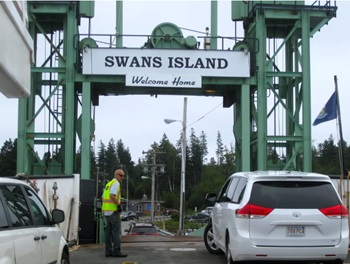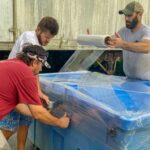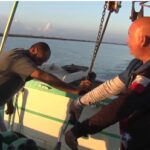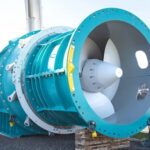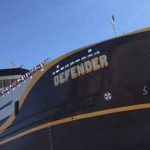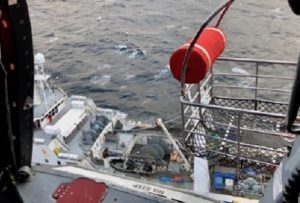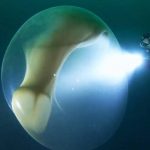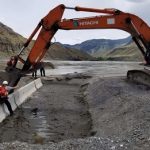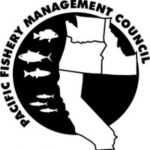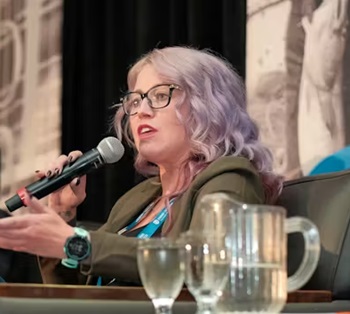 After two seasons of navigating turbulent waters, there is a sense of hope that the Newfoundland and Labrador fishery can finally sail into calmer conditions in April 2024. There was certainly no shortage of conflict on many fronts in 2024, despite efforts to get past some of the tensions that plagued the 2023 season. The provincial government had to step in and help resolve a tie-up by snow crab harvesters in the spring of 2023 that led to a six-week delay to the traditional start of the fishing season. The government formed a committee tasked with finding a better way to settle snow crab pricing, but even its recommendations failed to prevent another disagreement that led to another delayed start in April 2024. more, >>CLICK TO READ<< 09:01
After two seasons of navigating turbulent waters, there is a sense of hope that the Newfoundland and Labrador fishery can finally sail into calmer conditions in April 2024. There was certainly no shortage of conflict on many fronts in 2024, despite efforts to get past some of the tensions that plagued the 2023 season. The provincial government had to step in and help resolve a tie-up by snow crab harvesters in the spring of 2023 that led to a six-week delay to the traditional start of the fishing season. The government formed a committee tasked with finding a better way to settle snow crab pricing, but even its recommendations failed to prevent another disagreement that led to another delayed start in April 2024. more, >>CLICK TO READ<< 09:01
Tag Archives: fishing industry
Local Fishing Industry Worried About Potential Environmental Risks from Baltic III
 People in the Bay of Islands are worried that a ship which ran aground in the winter is still sitting there, posing a significant threat to the rich fishing grounds off Lark Harbour and York Harbour. FFAW President Dwan Street notes that the Baltic III is sitting on the rocks in Cedar Cove with hazardous materials and fuel onboard. She says they have seen reports of structural damage, leaks, and an oily mixture in the engine room. The longer the situation drags on, the greater the risk of a spill says the FFAW. more, >>CLICK TO READ<< 14:03
People in the Bay of Islands are worried that a ship which ran aground in the winter is still sitting there, posing a significant threat to the rich fishing grounds off Lark Harbour and York Harbour. FFAW President Dwan Street notes that the Baltic III is sitting on the rocks in Cedar Cove with hazardous materials and fuel onboard. She says they have seen reports of structural damage, leaks, and an oily mixture in the engine room. The longer the situation drags on, the greater the risk of a spill says the FFAW. more, >>CLICK TO READ<< 14:03

Seafood operator applauds NOAA Fisheries cutbacks
One local seafood market owner is not sad to see the fisheries arm of the National Oceanic and Atmospheric Administration scaled back. NOAA Fisheries keeps track of fish stocks, determines when certain fish can be caught and sets catch limits. Last month, the Trump administration fired more than 160 fisheries employees. Those who rely on NOAA Fisheries say the cutbacks mean that stakeholders have lost a voice needed to manage coastal fisheries. But Gerald Pack, who owns Safe Harbor Seafood Market in Mayport, would be glad to see NOAA go. “If they laid NOAA off, it won’t bother the fishing industry,” Pack said. more, >>CLICK TO READ<< 07:55
Government went against scientific advice in setting fishing quotas, court told
 The Government went against scientific advice when it set maximum fishing quotas for 2024, risking the sustainability of stocks and the livelihoods of fishers, the High Court has heard. Blue Marine Foundation is bringing legal action against the Department for Environment, Food and Rural Affairs (Defra), saying it acted contrary to its commitments to protect the UK’s marine environment and fishing industry. Known as the Joint Fisheries Statement (JFS), the Government set eight objectives for managing the UK’s fish stocks, which include sustainability, reducing bycatch, protecting ecosystems and following scientific advice. more, >>CLICK TO READ<< 08:03
The Government went against scientific advice when it set maximum fishing quotas for 2024, risking the sustainability of stocks and the livelihoods of fishers, the High Court has heard. Blue Marine Foundation is bringing legal action against the Department for Environment, Food and Rural Affairs (Defra), saying it acted contrary to its commitments to protect the UK’s marine environment and fishing industry. Known as the Joint Fisheries Statement (JFS), the Government set eight objectives for managing the UK’s fish stocks, which include sustainability, reducing bycatch, protecting ecosystems and following scientific advice. more, >>CLICK TO READ<< 08:03
Lawmakers consider permanent funding for helpline for farmers, loggers and fishermen
 For more than a year, Oregonians involved in agriculture, forestry and the fishing industry have had a resource to help them when they’re in a mental health crisis. The AgriStress helpline, which launched in Oregon in September 2023, is geared toward people in those industries, offering a safe option to those who ordinarily might not seek help. “The pull-yourself-up-by-your-boot-strings mentality often prevents our community members from seeking help, making resources like the AgriStress helpline vital to breaking that cycle as imperative,” Republican state Rep. Bobby Levy of Echo, a longtime farmer and rancher, said during a recent legislative meeting on a bill to keep the line operating in perpetuity. more, >>CLICK TO READ<< 09:43
For more than a year, Oregonians involved in agriculture, forestry and the fishing industry have had a resource to help them when they’re in a mental health crisis. The AgriStress helpline, which launched in Oregon in September 2023, is geared toward people in those industries, offering a safe option to those who ordinarily might not seek help. “The pull-yourself-up-by-your-boot-strings mentality often prevents our community members from seeking help, making resources like the AgriStress helpline vital to breaking that cycle as imperative,” Republican state Rep. Bobby Levy of Echo, a longtime farmer and rancher, said during a recent legislative meeting on a bill to keep the line operating in perpetuity. more, >>CLICK TO READ<< 09:43
Hampton Bays business owner worries closed Ponquogue Bridge will impact his livelihood
 A business owner in the Hampton Bays is worrying about economic impacts that the closure of the Ponquogue Bridge will have on his livelihood. The Ponquoge Bridge was suddenly closed to cars and pedestrians Friday after a Department of Transportation crew’s routine inspection found the concrete girders were deteriorating. “This is actually a lifeline for not only Hampton Bays — this is a lifeline for the Hamptons and Long Island as well,” said John Capuano, of Hampton Bays. Now that the Ponquogue Bridge is closed in Hampton Bays, Capuano wonders how it will affect the area if it stays closed in the warmer months. “Not only to the people trying to enjoy the area but the economics of all the businesses in town: The pizza parlors, the motels, they’re just not going to have the business,” he said. Capuano is the captain of the Shinnecock Star, a daily fishing boat in Hampton Bays. He says if the bridge doesn’t open by the spring, his business will be impacted. more, >>Click to read<< 13:29
A business owner in the Hampton Bays is worrying about economic impacts that the closure of the Ponquogue Bridge will have on his livelihood. The Ponquoge Bridge was suddenly closed to cars and pedestrians Friday after a Department of Transportation crew’s routine inspection found the concrete girders were deteriorating. “This is actually a lifeline for not only Hampton Bays — this is a lifeline for the Hamptons and Long Island as well,” said John Capuano, of Hampton Bays. Now that the Ponquogue Bridge is closed in Hampton Bays, Capuano wonders how it will affect the area if it stays closed in the warmer months. “Not only to the people trying to enjoy the area but the economics of all the businesses in town: The pizza parlors, the motels, they’re just not going to have the business,” he said. Capuano is the captain of the Shinnecock Star, a daily fishing boat in Hampton Bays. He says if the bridge doesn’t open by the spring, his business will be impacted. more, >>Click to read<< 13:29
Seafood sector is united in face of tariff threats, says N.L.’s fisheries minister
 A unified effort to navigate the Newfoundland and Labrador seafood industry through the uncertainty of U.S. tariff threats began on Wednesday, with more than two dozen people joining by video conference in the first fishery roundtable meeting. The meeting was chaired by Fisheries Minister Gerry Byrne, who described the discussions as “one of the best meetings I’ve ever hosted.” The meeting was spawned from a broader premier’s roundtable that was assembled last month in response to a threat from U.S. President Donald Trump to place a 25 per cent tariff on Canadian goods entering the U.S. market, including seafood. Joining the meeting were leaders in all sectors of the fishery, including union leaders, processors, harvesters, marketing specialists and the aquaculture industry. more, >>CLICK TO READ<< 18:42
A unified effort to navigate the Newfoundland and Labrador seafood industry through the uncertainty of U.S. tariff threats began on Wednesday, with more than two dozen people joining by video conference in the first fishery roundtable meeting. The meeting was chaired by Fisheries Minister Gerry Byrne, who described the discussions as “one of the best meetings I’ve ever hosted.” The meeting was spawned from a broader premier’s roundtable that was assembled last month in response to a threat from U.S. President Donald Trump to place a 25 per cent tariff on Canadian goods entering the U.S. market, including seafood. Joining the meeting were leaders in all sectors of the fishery, including union leaders, processors, harvesters, marketing specialists and the aquaculture industry. more, >>CLICK TO READ<< 18:42
Fishery in jeopardy: Trump tariff threat putting NL fishing season at risk
 The threat of looming American tariffs on Canadian exports doesn’t just have the Newfoundland and Labrador fishing industry concerned about bottom lines. There’s a worry if there can be a fishery at all. Often sides that are at odds with one another on many matters, both the association representing the province’s seafood processing companies and the union representing the province’s fish harvesters and plant workers held a joint news conference in St. John’s on Monday, Feb. 3, to discuss the situation the fishery finds itself with 25 per cent tariffs expected to be imposed on Canadian exports into the United States. A last-minute negotiation between Prime Minister Justin Trudeau and US President Donald Trump on Feb. 3 delayed the tariff threat for 30 days. more, >>CLICK TO READ<< 16:03
The threat of looming American tariffs on Canadian exports doesn’t just have the Newfoundland and Labrador fishing industry concerned about bottom lines. There’s a worry if there can be a fishery at all. Often sides that are at odds with one another on many matters, both the association representing the province’s seafood processing companies and the union representing the province’s fish harvesters and plant workers held a joint news conference in St. John’s on Monday, Feb. 3, to discuss the situation the fishery finds itself with 25 per cent tariffs expected to be imposed on Canadian exports into the United States. A last-minute negotiation between Prime Minister Justin Trudeau and US President Donald Trump on Feb. 3 delayed the tariff threat for 30 days. more, >>CLICK TO READ<< 16:03
Norfolk businesses reflect on backing Brexit
 It has been five years since the UK officially left the European Union and became an independent nation. Opinion polls suggest a majority of people now believe Brexit has been bad for the UK – and it is widely accepted it has, in the short term at least, adversely affected some of those who trade with the EU. Two Norfolk business owners, who both voted Leave, have shared their views on whether it was right to back Brexit. Steven Williamson is the director of Lynn Shellfish, based in King’s Lynn. His factory processes freshly caught whelks, shrimps, cockles, mussels and scallops, most of which are sold to the European and Asian markets. Rachael Waring is the co-owner of Warings Furniture, which makes products for the hospitality trade and employs about 60 people in Larling. more, >>CLICK TO READ<< 07:42
It has been five years since the UK officially left the European Union and became an independent nation. Opinion polls suggest a majority of people now believe Brexit has been bad for the UK – and it is widely accepted it has, in the short term at least, adversely affected some of those who trade with the EU. Two Norfolk business owners, who both voted Leave, have shared their views on whether it was right to back Brexit. Steven Williamson is the director of Lynn Shellfish, based in King’s Lynn. His factory processes freshly caught whelks, shrimps, cockles, mussels and scallops, most of which are sold to the European and Asian markets. Rachael Waring is the co-owner of Warings Furniture, which makes products for the hospitality trade and employs about 60 people in Larling. more, >>CLICK TO READ<< 07:42
Massachusetts offshore wind project that Biden visited is no more as Trump retakes office
 A $300 million offshore wind cable plant development project in Somerset that President Biden visited in July 2022, ushering in the country’s transition to clean energy, is off the table after its Italian developer walked away from it. The Prysmian Group backed out of its nearly three-year endeavor of gaining necessary local and state permits on Friday, days before President-elect Trump retakes office, saying it wouldn’t purchase the land needed for the effort. Massachusetts Congressman Jake Auchincloss called Prysmian’s decision to walk away from its submarine cables factory at Brayton Point “disappointing and discouraging.” “Donald Trump has unraveled (the) promise of good jobs by threatening a moratorium on offshore wind,” Auchincloss said in a statement Friday night, “generating so much uncertainty that companies pull back investment.” The Prysmian Group did not explicitly connect its withdrawal from the project to Trump’s cutdown threat. more, >>CLICK TO READ<< 16:32
A $300 million offshore wind cable plant development project in Somerset that President Biden visited in July 2022, ushering in the country’s transition to clean energy, is off the table after its Italian developer walked away from it. The Prysmian Group backed out of its nearly three-year endeavor of gaining necessary local and state permits on Friday, days before President-elect Trump retakes office, saying it wouldn’t purchase the land needed for the effort. Massachusetts Congressman Jake Auchincloss called Prysmian’s decision to walk away from its submarine cables factory at Brayton Point “disappointing and discouraging.” “Donald Trump has unraveled (the) promise of good jobs by threatening a moratorium on offshore wind,” Auchincloss said in a statement Friday night, “generating so much uncertainty that companies pull back investment.” The Prysmian Group did not explicitly connect its withdrawal from the project to Trump’s cutdown threat. more, >>CLICK TO READ<< 16:32
Local fishing boats depart for Alaska
 A number of the larger commercial fishing boats that call Newport’s Yaquina Bay their home headed out last week for the annual trek to Alaska’s Bering Sea. It can take eight to 10 days for them to make the journey up north, depending on the weather. Boats from Newport will be docking either at Dutch Harbor or Kodiak, where they will be based while fishing for pollack and cod, a fishery that generally lasts for several months. The Port of Newport’s International Terminal was hopping with activity last week as boat owners and their crews made final preparations. Photos, more, >>CLICK TO READ<< 06:32
A number of the larger commercial fishing boats that call Newport’s Yaquina Bay their home headed out last week for the annual trek to Alaska’s Bering Sea. It can take eight to 10 days for them to make the journey up north, depending on the weather. Boats from Newport will be docking either at Dutch Harbor or Kodiak, where they will be based while fishing for pollack and cod, a fishery that generally lasts for several months. The Port of Newport’s International Terminal was hopping with activity last week as boat owners and their crews made final preparations. Photos, more, >>CLICK TO READ<< 06:32
People who fish off P.E.I. have mixed reaction to new parental leave benefits
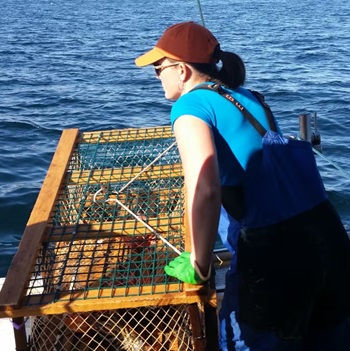 Some lobster fishing captains on Prince Edward Island say they think there will be little interest in new parental leave benefits just announced by the federal government. On Thursday, Ottawa announced maternity and parental benefits for people licensed to fish in Atlantic Canada, saying that could encourage the next generation of harvesters to join the fishing industry and provide more flexibility to those with new families. “I don’t think there’ll be a lot of uptake on it,” said lobster captain Charlie McGeoghegan, who fishes out of Pinette on P.E.I.’s south shore. “I haven’t heard anybody even ask for it, so I’m not sure where this came from.” Video, more, >>CLICK TO READ<< 07:26
Some lobster fishing captains on Prince Edward Island say they think there will be little interest in new parental leave benefits just announced by the federal government. On Thursday, Ottawa announced maternity and parental benefits for people licensed to fish in Atlantic Canada, saying that could encourage the next generation of harvesters to join the fishing industry and provide more flexibility to those with new families. “I don’t think there’ll be a lot of uptake on it,” said lobster captain Charlie McGeoghegan, who fishes out of Pinette on P.E.I.’s south shore. “I haven’t heard anybody even ask for it, so I’m not sure where this came from.” Video, more, >>CLICK TO READ<< 07:26
‘Stricken’ Devon fishing industry faces ‘labyrinth’ of red tape
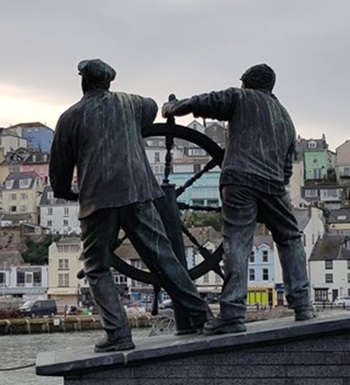 The government has been urged to overhaul visa regulations for overseas workers as a way of helping the ‘stricken’ Devon fishing industry. It’s claimed the trade, which is one of the county’s highest-profile industries, faces a ‘labyrinth’ of red tape. The port of Brixham currently lands fish of the highest value, but the area’s MP has told a top-level debate on the industry that fishing communities need help urgently. Liberal Democrat MP for South Devon, Caroline Voaden, told a meeting at Westminster Hall that promises made in the run-up to a ‘botched’ Brexit had been broken, and an avalanche of red tape had since engulfed the industry. more, >>CLICK TO READ<< 06:20
The government has been urged to overhaul visa regulations for overseas workers as a way of helping the ‘stricken’ Devon fishing industry. It’s claimed the trade, which is one of the county’s highest-profile industries, faces a ‘labyrinth’ of red tape. The port of Brixham currently lands fish of the highest value, but the area’s MP has told a top-level debate on the industry that fishing communities need help urgently. Liberal Democrat MP for South Devon, Caroline Voaden, told a meeting at Westminster Hall that promises made in the run-up to a ‘botched’ Brexit had been broken, and an avalanche of red tape had since engulfed the industry. more, >>CLICK TO READ<< 06:20
Donegal fishermen frustrated as general election looms: ‘We are the fish basket of Europe, yet we’re the poor relation’
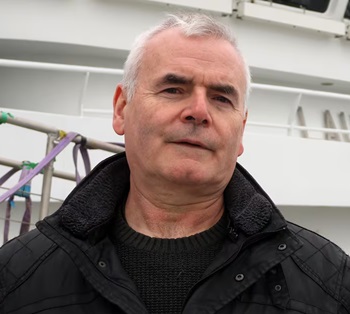 This should be the busiest time of year. Pelagic fish, the species found near the surface of the ocean, are most plentiful in the North Atlantic from late autumn to early summer. The season peaks either side of Christmas, but every fishing vessel is tied up at the pier. Local fisherman Denis Carbery landed 1,100 tonnes of mackerel last month from his trawler, Lauren, and that was it for the year; he will not take to sea again until January. Charlie Doherty’s fishing vessel Áine has not gone to sea since March because of quotas. It’s an impressive vessel, just seven years old. Doherty is scathing of all the political parties, wondering why there are no Irish MEPs on the EU fisheries committee while Hungary, a landlocked country, has representatives on it. more, >>CLICK TO READ<< 09:38
This should be the busiest time of year. Pelagic fish, the species found near the surface of the ocean, are most plentiful in the North Atlantic from late autumn to early summer. The season peaks either side of Christmas, but every fishing vessel is tied up at the pier. Local fisherman Denis Carbery landed 1,100 tonnes of mackerel last month from his trawler, Lauren, and that was it for the year; he will not take to sea again until January. Charlie Doherty’s fishing vessel Áine has not gone to sea since March because of quotas. It’s an impressive vessel, just seven years old. Doherty is scathing of all the political parties, wondering why there are no Irish MEPs on the EU fisheries committee while Hungary, a landlocked country, has representatives on it. more, >>CLICK TO READ<< 09:38
Suggested areas for offshore wind around N.S. swell in size
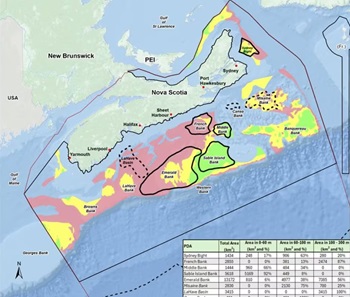 Offshore areas around Nova Scotia recommended for wind energy projects have ballooned in size in the latest version of a report for government, troubling some in the fishing industry who are bracing for disruptions. The draft final report comes from the regional assessment committee, which was tasked by the province and Ottawa two years ago to investigate the potential impacts of offshore wind development on Nova Scotia. It describes eight potential development areas that cover a total of 31,200 square kilometres. The areas stretch from the tip of George’s Bank southwest of Nova Scotia, up the Atlantic coastline and around Cape Breton Island. more, >>CLICK TO READ<< 08:14
Offshore areas around Nova Scotia recommended for wind energy projects have ballooned in size in the latest version of a report for government, troubling some in the fishing industry who are bracing for disruptions. The draft final report comes from the regional assessment committee, which was tasked by the province and Ottawa two years ago to investigate the potential impacts of offshore wind development on Nova Scotia. It describes eight potential development areas that cover a total of 31,200 square kilometres. The areas stretch from the tip of George’s Bank southwest of Nova Scotia, up the Atlantic coastline and around Cape Breton Island. more, >>CLICK TO READ<< 08:14
Call for fishermen to join farmers’ protest
 Great Yarmouth skipper Paul Lines and Lowestoft fishmarket boss and former MEP June Mummery are calling on the fishing industry to back a farmers’ protest at Westminster next Tuesday, 19 November. The protest has been called following the announcement in the recent budget that farmland would no longer be exempt from inheritance tax but has rapidly moved to encompass wider concerns about food security. Paul Lines will be wearing wet-weather gear, including his sou’wester, to highlight the concerns of the fishing industry, and is calling on other fishermen to join him, if possible, similarly dressed. more, >>CLICK TO READ<< 07:40
Great Yarmouth skipper Paul Lines and Lowestoft fishmarket boss and former MEP June Mummery are calling on the fishing industry to back a farmers’ protest at Westminster next Tuesday, 19 November. The protest has been called following the announcement in the recent budget that farmland would no longer be exempt from inheritance tax but has rapidly moved to encompass wider concerns about food security. Paul Lines will be wearing wet-weather gear, including his sou’wester, to highlight the concerns of the fishing industry, and is calling on other fishermen to join him, if possible, similarly dressed. more, >>CLICK TO READ<< 07:40
Right whale population grows 4%, but extinction remains a threat
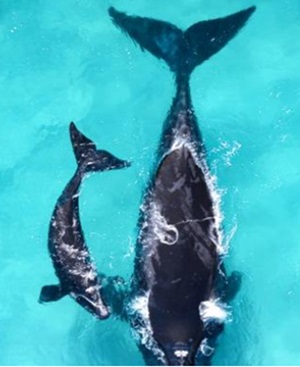 Conservationists are calling on the government, shipping and fishing industries to save the North Atlantic right whale from extinction despite an increase in its population. Researchers studying the whales said this week that the population increased to an estimated 372 in 2023. That’s an increase of about four percent from 2020, and “heartening news” after the whale’s population fell by about 25 percent from 2010 to 2020. The population of the right whale, which can weigh up to 150,000 pounds (68,039 kilograms) and lives off the East Coast, plummeted in the 2010s. Stressed by global warming and vulnerable to ship collisions and entanglement in fishing gear, their numbers fell to fewer than 360 by the early 2020s. more, >>CLICK TO READ<< 12:29
Conservationists are calling on the government, shipping and fishing industries to save the North Atlantic right whale from extinction despite an increase in its population. Researchers studying the whales said this week that the population increased to an estimated 372 in 2023. That’s an increase of about four percent from 2020, and “heartening news” after the whale’s population fell by about 25 percent from 2010 to 2020. The population of the right whale, which can weigh up to 150,000 pounds (68,039 kilograms) and lives off the East Coast, plummeted in the 2010s. Stressed by global warming and vulnerable to ship collisions and entanglement in fishing gear, their numbers fell to fewer than 360 by the early 2020s. more, >>CLICK TO READ<< 12:29
Regulators delay increase in minimum lobster size till July
 Regulators formally delayed increasing the minimum size of lobsters harvested in the Gulf of Maine to July. The Atlantic States Marine Fisheries Commission, the regulatory body that oversees the fishing industry, voted Monday to delay the resolution by six months. The changes were previously slated to take effect in January, but opponents have argued it would give Canadian lobstermen – unimpacted by the change, though they share the waters – an unfair advantage in the market. Lobstermen also have claimed the change could practically eliminate the harvest of some of the industry’s most popular lobster sizes. more, >>CLICK TO READ<< 21:06
Regulators formally delayed increasing the minimum size of lobsters harvested in the Gulf of Maine to July. The Atlantic States Marine Fisheries Commission, the regulatory body that oversees the fishing industry, voted Monday to delay the resolution by six months. The changes were previously slated to take effect in January, but opponents have argued it would give Canadian lobstermen – unimpacted by the change, though they share the waters – an unfair advantage in the market. Lobstermen also have claimed the change could practically eliminate the harvest of some of the industry’s most popular lobster sizes. more, >>CLICK TO READ<< 21:06
Cortez fishing village works to recover after hurricanes Helene and Milton
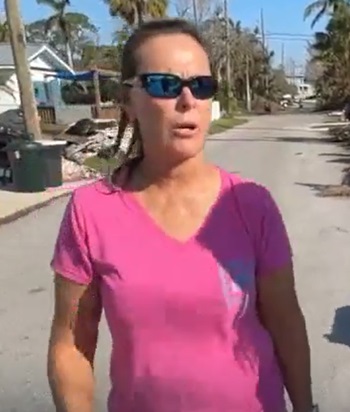 There is devastation on every corner in Cortez Village, a quaint fishing village off the coast of Manatee County. Hurricanes Helene and Milton hit this community hard, and now they are working to pick up the pieces and preserve their historic village. Captain Kathy Fannon showed us the damage to her home. She said it is hard to see the reality that lies ahead. “We lost everything. Everyone on this block had four feet of water through their house, so we lost all the contents. We have absolutely nothing left inside,” Captain Kathy said. Captain Kathy’s family works in the fishing industry, and her daughter, Katie Tupin, lives across the street. Tupin said, “My dad runs a shrimping boat. He’s a commercial fisherman. I’ve been doing charters for 14 years and my mom for 25. Both lost everything during the storm. Video, more, >> CLICK TO READ<< 14:09
There is devastation on every corner in Cortez Village, a quaint fishing village off the coast of Manatee County. Hurricanes Helene and Milton hit this community hard, and now they are working to pick up the pieces and preserve their historic village. Captain Kathy Fannon showed us the damage to her home. She said it is hard to see the reality that lies ahead. “We lost everything. Everyone on this block had four feet of water through their house, so we lost all the contents. We have absolutely nothing left inside,” Captain Kathy said. Captain Kathy’s family works in the fishing industry, and her daughter, Katie Tupin, lives across the street. Tupin said, “My dad runs a shrimping boat. He’s a commercial fisherman. I’ve been doing charters for 14 years and my mom for 25. Both lost everything during the storm. Video, more, >> CLICK TO READ<< 14:09
MPAs and windfarm proposals labelled an ‘absolute attack’ on the fishing industry
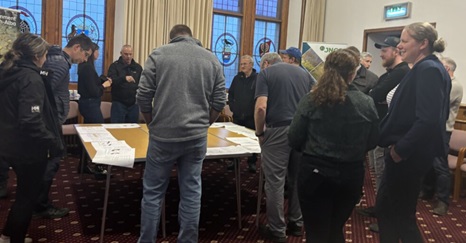 Fisherman have condemned plans to introduce MPAs (marine protected areas) and an offshore windfarm on the isles fishing grounds – with a lack of “evidence” at the forefront of concerns. A public exhibition of the Stoura Offshore Windfarm was held on Thursday at Shetland Museum followed by a drop-in consultation yesterday at Lerwick Town Hall to respond to the MPA proposals. Fears for the future of the fishing industry were heard at both events this week. Skerries whitefish fisherman James Anderson said the MPA proposals will “not do any good at all” and continuously closing off areas poses a significant threat to the sector. more, >>CLICK TO READ<< 06:34
Fisherman have condemned plans to introduce MPAs (marine protected areas) and an offshore windfarm on the isles fishing grounds – with a lack of “evidence” at the forefront of concerns. A public exhibition of the Stoura Offshore Windfarm was held on Thursday at Shetland Museum followed by a drop-in consultation yesterday at Lerwick Town Hall to respond to the MPA proposals. Fears for the future of the fishing industry were heard at both events this week. Skerries whitefish fisherman James Anderson said the MPA proposals will “not do any good at all” and continuously closing off areas poses a significant threat to the sector. more, >>CLICK TO READ<< 06:34
NFFO Challenges Crown Estate: Food Security or Energy Production
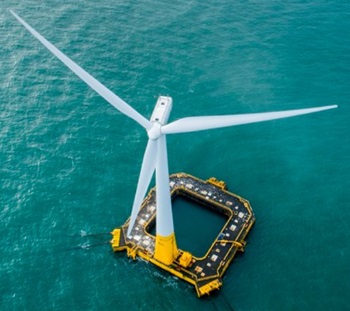 This week, The Crown Estate unveiled an ambitious new vision for Britain’s seas, prioritising the development of offshore wind farms. The new Marine Delivery Routemap outlines plans for significant offshore wind capacity, with the potential for up to 140GW of wind power to be installed or planned by 2040. However, this massive shift towards industrialising the marine environment has sparked concerns within the fishing industry, which fears the impact on traditional fishing grounds and coastal communities. The proposed expansion will see tens of thousands of square kilometres of the UK’s waters leased for offshore wind development, raising concerns about the overlap with areas vital to food production through fishing. Fishermen, who have been working Britain’s seas for generations, worry that the scale of these developments could disrupt the industry on an unprecedented scale. more, >>CLICK TO READ<< 17:07
This week, The Crown Estate unveiled an ambitious new vision for Britain’s seas, prioritising the development of offshore wind farms. The new Marine Delivery Routemap outlines plans for significant offshore wind capacity, with the potential for up to 140GW of wind power to be installed or planned by 2040. However, this massive shift towards industrialising the marine environment has sparked concerns within the fishing industry, which fears the impact on traditional fishing grounds and coastal communities. The proposed expansion will see tens of thousands of square kilometres of the UK’s waters leased for offshore wind development, raising concerns about the overlap with areas vital to food production through fishing. Fishermen, who have been working Britain’s seas for generations, worry that the scale of these developments could disrupt the industry on an unprecedented scale. more, >>CLICK TO READ<< 17:07
Vineyard Wind Installed the Largest Offshore Turbines in the World. Were They Ready for Primetime?
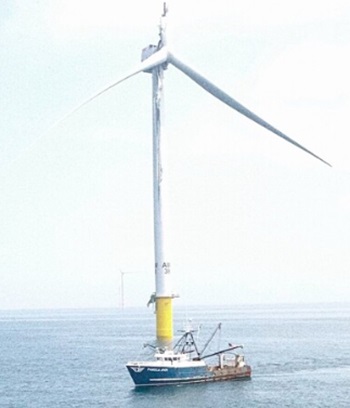 When Vineyard Wind completed the installation of the first GE Vernova Haliade-X 13-megawatt wind turbine in the waters southwest of Nantucket in October 2023, the company trumpeted it as “the largest turbine in the western world.” It was supposed to be one of the 62 turbines that would make up the first large-scale, commercial offshore wind farm in the United States. But just nine months later, the project has been suspended by the federal government after the now infamous turbine blade failure on July 13th that left Nantucket’s beaches and the waters surrounding the island littered with fiberglass and styrofoam debris that is still being recovered. While offshore wind energy production has a decades-long track record in Europe and Asia, the Vineyard Wind project was the first of its kind in the United States, and the turbines Vineyard Wind is installing are larger and more powerful than any that have come before it. Photos, more, >>CLICK TO READ<< 14:55
When Vineyard Wind completed the installation of the first GE Vernova Haliade-X 13-megawatt wind turbine in the waters southwest of Nantucket in October 2023, the company trumpeted it as “the largest turbine in the western world.” It was supposed to be one of the 62 turbines that would make up the first large-scale, commercial offshore wind farm in the United States. But just nine months later, the project has been suspended by the federal government after the now infamous turbine blade failure on July 13th that left Nantucket’s beaches and the waters surrounding the island littered with fiberglass and styrofoam debris that is still being recovered. While offshore wind energy production has a decades-long track record in Europe and Asia, the Vineyard Wind project was the first of its kind in the United States, and the turbines Vineyard Wind is installing are larger and more powerful than any that have come before it. Photos, more, >>CLICK TO READ<< 14:55
Vineyard Wind crisis: Fishermen blast feds for saying they don’t care about whales
 The claim came during a Thursday hearing in Boston federal appeals court as two fishing groups look to toss Vineyard Wind’s underlying permit, arguing regulators failed to analyze how the project would impact the environment and fishermen. “The alliance, as a trade association representing the fishing industry, does not have any interest in protecting right whales,” said attorney Thekla Hansen-Young, representing the Department of the Interior, the National Marine Fisheries Service, among other federal agencies, in the dispute. Hansen-Young was referring to the Responsible Offshore Development Alliance, one of the groups fighting the feds and Vineyard Wind. Seafreeze Shoreside Inc. is the other. more, >>CLICK TO READ<< 13:06
The claim came during a Thursday hearing in Boston federal appeals court as two fishing groups look to toss Vineyard Wind’s underlying permit, arguing regulators failed to analyze how the project would impact the environment and fishermen. “The alliance, as a trade association representing the fishing industry, does not have any interest in protecting right whales,” said attorney Thekla Hansen-Young, representing the Department of the Interior, the National Marine Fisheries Service, among other federal agencies, in the dispute. Hansen-Young was referring to the Responsible Offshore Development Alliance, one of the groups fighting the feds and Vineyard Wind. Seafreeze Shoreside Inc. is the other. more, >>CLICK TO READ<< 13:06
Warning of Potential Conflict Between Fishing Industry and Energy Developers
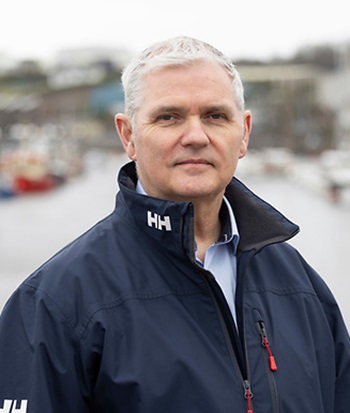 There is a potential for conflict between fishermen and the ‘blue economy’ strategists, according to one of the leading figures in the fishing industry. The fishing industry says that it supports the need for climate change, but it is being claimed that it is being “squeezed out” of traditional fishing grounds and that the role of the industry as a food supplier is not being understood by Government, offshore renewable energy developers or environmentalists. The Chief Executive of the Irish Fish Producers’ Organisation, Aodh O Donnell, has now warned of potential conflict and that there is a commercial motive of exporting power outside Ireland, while fishing operations and practices could be closed. more, >>CLICK TO READ<< 07:38
There is a potential for conflict between fishermen and the ‘blue economy’ strategists, according to one of the leading figures in the fishing industry. The fishing industry says that it supports the need for climate change, but it is being claimed that it is being “squeezed out” of traditional fishing grounds and that the role of the industry as a food supplier is not being understood by Government, offshore renewable energy developers or environmentalists. The Chief Executive of the Irish Fish Producers’ Organisation, Aodh O Donnell, has now warned of potential conflict and that there is a commercial motive of exporting power outside Ireland, while fishing operations and practices could be closed. more, >>CLICK TO READ<< 07:38
Fishermen keep fighting against offshore turbines
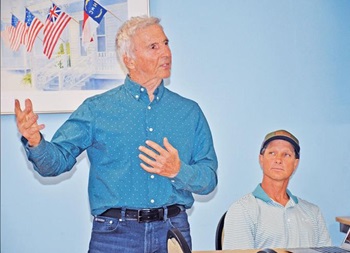 It’s a fishing story that’s not being told. That is how some members of the North Carolina For-Hire Captain’s Association (NCFHCA) feel about what they see as a threat offshore wind turbines would pose to the local fishing industry, economy, wildlife and environment. “No matter how we feel or whatever, the feds are shoving this down our throat and it doesn’t matter what we say,” said Capt. Cane Faircloth, a NCFHCA board member who handles media, public relations and marketing for the association of about 300 people. The subject is dear to the heart of Dr. Nick Degennaro of Southport, who has worked in the offshore industry for 30 years and has a doctorate in commercial engineering from the University of Rhode Island. He is opposed to offshore wind energy. This issue is so important to him, “because it’s going to destroy the ocean,” he said. Degennaro said areas that have offshore wind turbines become “dead zones” for fishing. more, >>click to read<< 10:48
It’s a fishing story that’s not being told. That is how some members of the North Carolina For-Hire Captain’s Association (NCFHCA) feel about what they see as a threat offshore wind turbines would pose to the local fishing industry, economy, wildlife and environment. “No matter how we feel or whatever, the feds are shoving this down our throat and it doesn’t matter what we say,” said Capt. Cane Faircloth, a NCFHCA board member who handles media, public relations and marketing for the association of about 300 people. The subject is dear to the heart of Dr. Nick Degennaro of Southport, who has worked in the offshore industry for 30 years and has a doctorate in commercial engineering from the University of Rhode Island. He is opposed to offshore wind energy. This issue is so important to him, “because it’s going to destroy the ocean,” he said. Degennaro said areas that have offshore wind turbines become “dead zones” for fishing. more, >>click to read<< 10:48
Fishing industry reels over Biden’s destructive wind farm plan: It’s ‘coming at us from every direction’
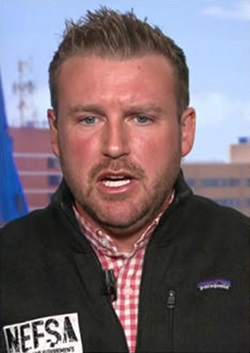 Time is running out for fishermen and women in the Northeast who fear their industry is being put at risk by the Biden administration’s renewable energy agenda. “Ground fishermen, lobstermen, whatever you are, you’re under the microscope right now, and it just seems to be something coming at us from every direction,” New England Fishermen’s Stewardship Association (NEFSA) COO Dustin Delano said on “The Big Money Show” Monday. “And with this offshore wind agenda out there to attempt to fight climate change,” he continued, “it’s almost like environmentalists and different folks are willing to destroy the environment to protect the environment.” Video, photos, more, >>click to read<< 08:52
Time is running out for fishermen and women in the Northeast who fear their industry is being put at risk by the Biden administration’s renewable energy agenda. “Ground fishermen, lobstermen, whatever you are, you’re under the microscope right now, and it just seems to be something coming at us from every direction,” New England Fishermen’s Stewardship Association (NEFSA) COO Dustin Delano said on “The Big Money Show” Monday. “And with this offshore wind agenda out there to attempt to fight climate change,” he continued, “it’s almost like environmentalists and different folks are willing to destroy the environment to protect the environment.” Video, photos, more, >>click to read<< 08:52
Press Democrat Editorial: North Coast fishers need help
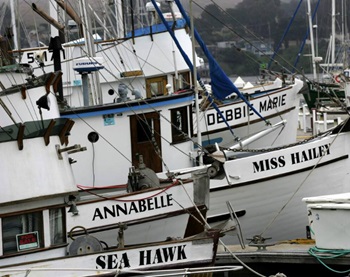 The bad news keeps piling up for the North Coast’s beleaguered fishing industry. Crab season was delayed yet again this winter, and now salmon season may be canceled entirely for the second consecutive year. Even a hopeful development — the ongoing removal of four obsolete hydroelectric dams on the Klamath River — turned sour when as many as 830,000 hatchery fish died within days after being released in the Klamath, apparently because of high water pressure inside a bypass tunnel at Iron Gate Dam. Commercial and sport fishing have supported families in Bodega Bay, Fort Bragg and other North Coast towns for generations. “The identity of Bodega Bay is fishing,” Dick Ogg, a local skipper and president of the Bodega Bay Fisherman’s Marketing Association, told the editorial board. “The town itself, that is what we are, fishermen.” more, >>click to read<< 07:01
The bad news keeps piling up for the North Coast’s beleaguered fishing industry. Crab season was delayed yet again this winter, and now salmon season may be canceled entirely for the second consecutive year. Even a hopeful development — the ongoing removal of four obsolete hydroelectric dams on the Klamath River — turned sour when as many as 830,000 hatchery fish died within days after being released in the Klamath, apparently because of high water pressure inside a bypass tunnel at Iron Gate Dam. Commercial and sport fishing have supported families in Bodega Bay, Fort Bragg and other North Coast towns for generations. “The identity of Bodega Bay is fishing,” Dick Ogg, a local skipper and president of the Bodega Bay Fisherman’s Marketing Association, told the editorial board. “The town itself, that is what we are, fishermen.” more, >>click to read<< 07:01
Why Fairer West Coast Fishing Needs More “Boots on Deck,” According to New Report
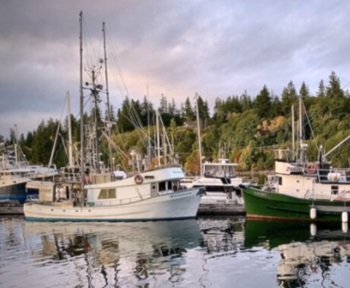 The West Coast fishing industry finds itself in increasingly troubled waters, according to a recent report from the Standing Committee on Fisheries and Oceans (FOPO). The parliamentary committee says unfair regulations and a lack of federal intervention have led to an uneven playing field for BC fishers. Unlike the Maritime provinces, where regulations limit corporate control and prioritize independent harvesters, there are no restrictions on ownership of commercial licenses and quotas on BC’s coast. As a result, owner-operators are often shut out of the process, jeopardizing their ability to make a sustainable living. “Fisheries are the fabric of our coastal communities, and they have been particularly in Indigenous communities for 10 to 15,000 years. Fish in the water are the birthright of all Canadians,” Sonia Strobel, CEO of Skipper Otto Community Supported Fishery, told us in an interview. photos, more, >>click to read<< 07:45
The West Coast fishing industry finds itself in increasingly troubled waters, according to a recent report from the Standing Committee on Fisheries and Oceans (FOPO). The parliamentary committee says unfair regulations and a lack of federal intervention have led to an uneven playing field for BC fishers. Unlike the Maritime provinces, where regulations limit corporate control and prioritize independent harvesters, there are no restrictions on ownership of commercial licenses and quotas on BC’s coast. As a result, owner-operators are often shut out of the process, jeopardizing their ability to make a sustainable living. “Fisheries are the fabric of our coastal communities, and they have been particularly in Indigenous communities for 10 to 15,000 years. Fish in the water are the birthright of all Canadians,” Sonia Strobel, CEO of Skipper Otto Community Supported Fishery, told us in an interview. photos, more, >>click to read<< 07:45
Greenlaw joins NEFSA board of directors
 Maine fisherman Linda Greenlaw has joined the New England Fishermen’s Stewardship Association’s board, “the only fishing organization I have been involved with,” she said Dec. 8 on Facebook while fishing off Isle au Haut. I … was so impressed with [CEO and founder Jerry Leeman’s] knowledge and logic and articulation of the issues and fisheries in general, with his experience as a fisherman who knows the industry being the leader and voice,” she added. more, >>click to read<< `12:53
Maine fisherman Linda Greenlaw has joined the New England Fishermen’s Stewardship Association’s board, “the only fishing organization I have been involved with,” she said Dec. 8 on Facebook while fishing off Isle au Haut. I … was so impressed with [CEO and founder Jerry Leeman’s] knowledge and logic and articulation of the issues and fisheries in general, with his experience as a fisherman who knows the industry being the leader and voice,” she added. more, >>click to read<< `12:53






